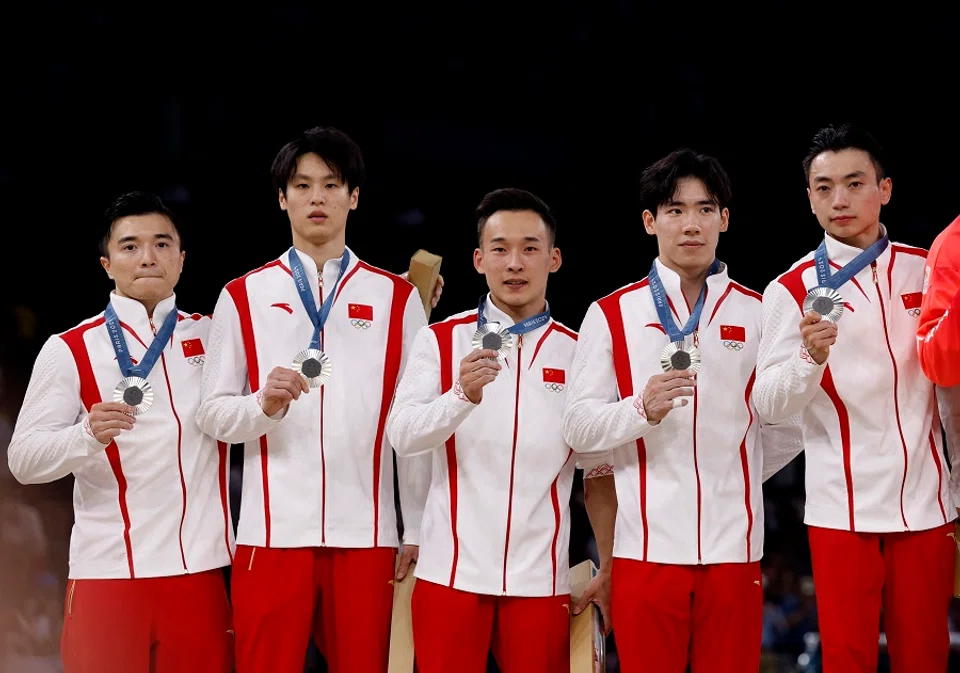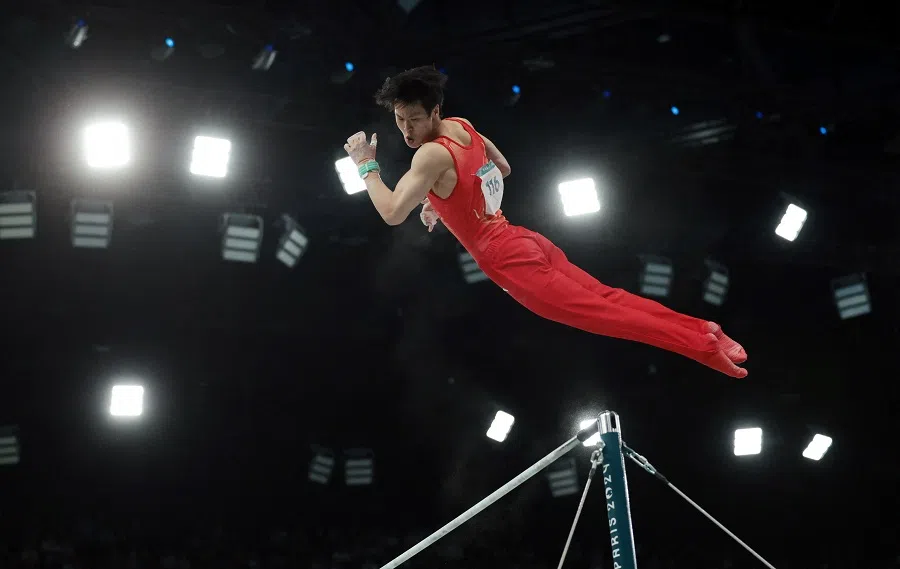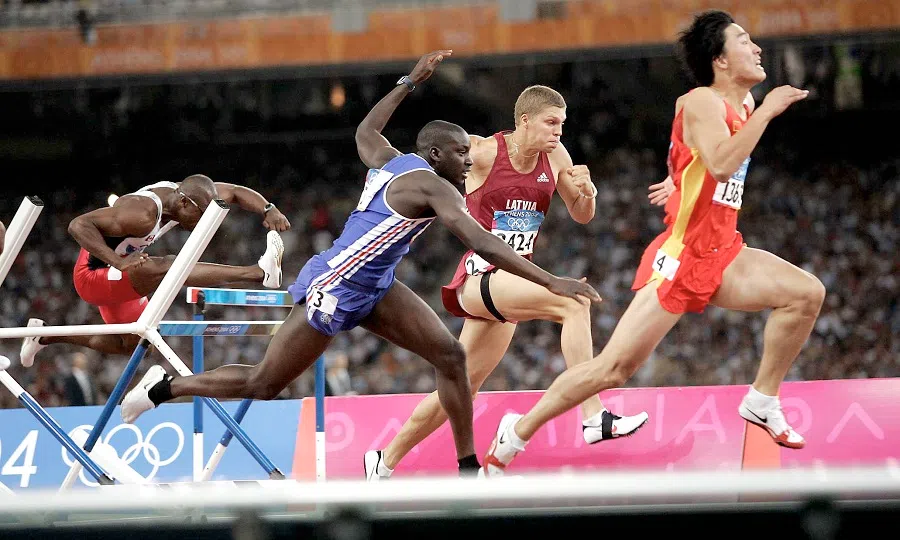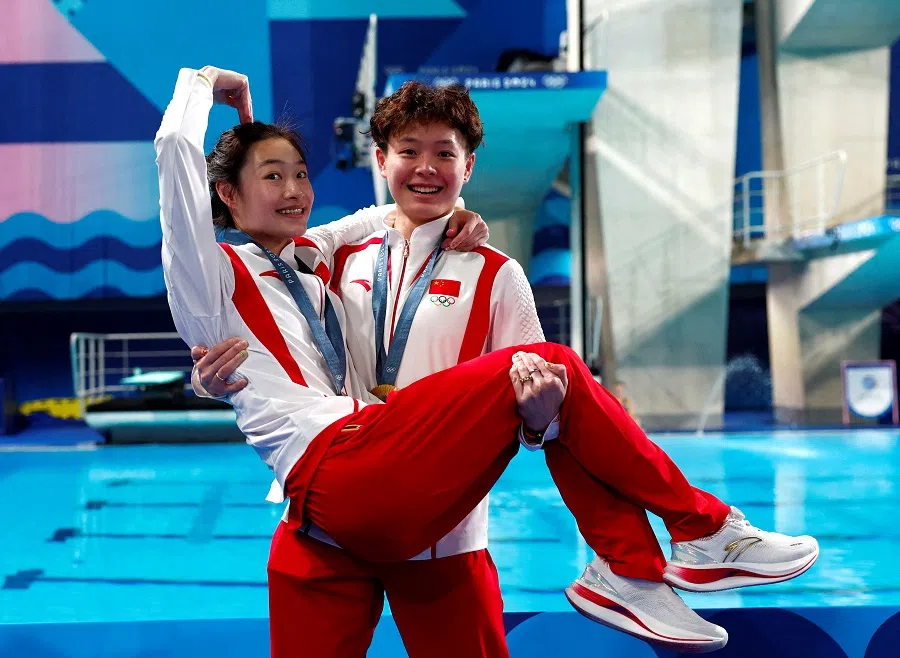Chinese Olympic athletes are people too: All that glitters is not gold
Lianhe Zaobao China news editor Yang Danxu looks at Chinese netizens’ penchant for only being interested in gold medals at the Olympics and being ever ready to criticise athletes for any flaws, real or perceived.

On the third day of competition at the Paris Olympics, another familiar storm of public opinion erupted on Chinese social media.
On 29 July local time, after five rounds in the men’s artistic gymnastics team finals, China was 3.267 points ahead of second-placed Japan.
Many Chinese sports fans who stayed up late to watch the event were almost certain that this gold medal — the top prize in Olympic gymnastics — was in the bag. China’s former Olympic champion Chen Yibing even posted an early congratulatory message on Weibo, celebrating the reclamation of the gold medal in the men’s gymnastics team finals, before the final round had ended.
Disaster at the brink of success
But no one saw what was coming next. In the last round, China’s Su Weide, who competed as a substitute, made a huge blunder as he fell twice during his bar routine. In the end, the Chinese men’s team lost narrowly by 0.532 points, letting the gold medal slip from their grasp to old rival Japan. At the post-match interview, Su was visibly distraught as he choked up and apologised to his teammates.
The Chinese had not been paying much attention to the Paris Olympics — after the opening ceremony, there was some animated online discussion, for example about host France’s multicultural opening ceremony as well as Chinese athletes winning gold in shooting and diving. But after the men’s gymnastics team missed out on the gold medal, China’s social media exploded.

Frustrated netizens pointed the finger at Su. Before the sun came up, a public opinion storm targeted at Su had erupted on social media, with relentless criticism, ridicule and abuse. Some netizens accused him of not being good enough and dragging down his teammates, costing the Chinese team the gold; others said his apology was inadequate and insincere; some even attacked his physique, saying he was skinny and weak, and that his arms were not muscular like a gymnast’s. As Su was replacing an injured teammate, some netizens began digging into his background, questioning if he had “connections”.
After the competition, China came in third in the gold medal tally with five golds, while Japan was on top with six, counting the gymnastics team gold. Many Chinese netizens found this hard to take; some of them elevated the issue to one of national honour, labelling Su as a “sinner against the people” (民族罪人) who had wrongfully cost China a gold medal, and for letting Japan take the top spot on the medal table.
... in the era of China’s rise, the battle for the top spot in the gold medal table with traditional sports powerhouses such as the US and Russia is seen by many as a symbol of China’s race to catch up with and surpass the world’s leading powers.
Quick to criticise
China has seen netizens heap criticism on athletes before. During the Beijing Olympics in 2008, Liu Xiang, who won the 110m hurdles gold medal at the 2004 Olympics in Athens, pulled out on his home ground due to injury, drawing the ire of the Chinese. Four years later in London, Liu crashed into the first hurdle and ended up finishing the race on one leg. Liu went from being a national idol to being labelled Liu paopao (刘跑跑, lit. Liu run run). Some called him a “coward”, while others accused him of playacting and throwing the race, with some others even criticising him for bringing shame to the country.
One would have thought that with the maturation of the Chinese audience and rise in national confidence, the “gold medal only” mentality would be gradually left behind. Yet, it is shocking that the first wave of intense debate surrounding the Paris Olympics is still about gold medals.

Since China won its first-ever Olympic gold medal in 1984, the Chinese people have become obsessed with Olympic gold medals, only having eyes for gold during the Games.
In the past few Olympics, some post-95s and post-00s generation Chinese athletes have not only shown their talents and displayed a relatively high level of skill, but also exuded authenticity, confidence and flair both on and off the field.
Only gold counts
The number of gold medals has always been a key target for the Chinese team as well, not only indicating the overall standard of national sports but also being seen as a sign of overall national strength; representing the country’s honour, spirit and ambition. In other words, the significance of Olympic gold medals in China goes far beyond sports itself. In particular, in the era of China’s rise, the battle for the top spot in the gold medal table with traditional sports powerhouses such as the US and Russia is seen by many as a symbol of China’s race to catch up with and surpass the world’s leading powers.
At the 2008 Beijing Olympics, mustering a “whole-of-nation” effort to nurture gold medallists, coupled with its home field advantage, China surpassed the US to take the top spot on the gold medal table for the first time, making many Chinese proud. While it was not top in the gold medal table at the 2012 London Olympics, 2016 Rio Olympics and 2021 Tokyo Olympics, it was always in the top three.
Athletes as people
In the past few Olympics, some post-95s and post-00s generation Chinese athletes have not only shown their talents and displayed a relatively high level of skill, but also exuded authenticity, confidence and flair both on and off the field. Athletes such as “Honghuang Girl” (洪荒少女, someone with some superhuman force or ability) Fu Yuanhui and shooter Yang Qian who made a heart sign with her arms have both rid themselves of the institutionalised and rigid image of athletes.
Faced with the Western media’s flurry of questions at the Paris Olympics involving doping issues and the unfair number of frequent drug tests before the competition, Chinese swimmer Zhang Yufei also managed to handle the situation maturely. She did not complain about the frequency of the tests, only airing her grievance of being worried that her rivals would see her with tinted lenses.
... respecting the objective reality that victory and defeat are inherent to competition, and responding to failure with maturity and tolerance is the true sign of societal progress.

Chinese media coverage of the Olympics is now no longer limited to the results and stories of athletes competing for their country. Instead, it amplifies the personalities of the athletes so that the public can see that they are just as genuine as ordinary people. Following the public opinion storm over the defeat of the men’s gymnastics team, state media such as People.cn and Xinhua published articles stressing that the country can strive to win gold medals but should not cling to the “gold medal only” mentality, and that the men’s gymnastic’s team loss of a gold medal is not the fault of one individual, hoping to guide the people away from the blind worship of gold medals.
Chinese society’s view of the Olympics and the image of athletes reflect changes in the social environment. Hopefully, the public opinion storm involving Su will subside soon. After all, respecting the objective reality that victory and defeat are inherent to competition, and responding to failure with maturity and tolerance is the true sign of societal progress.
This article was first published in Lianhe Zaobao as “失金牌就对不起民族?”.





![[Big read] When the Arctic opens, what happens to Singapore?](https://cassette.sphdigital.com.sg/image/thinkchina/da65edebca34645c711c55e83e9877109b3c53847ebb1305573974651df1d13a)